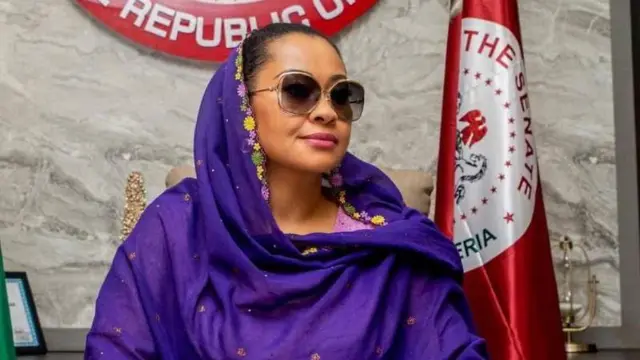Nigerian Senator Natasha Akpoti-Uduaghan was denied entry to the National Assembly on Tuesday, despite a federal high court ruling she claims allows her return. The senator was suspended in March after accusing Senate President Godswill Akpabio of sexual harassment an allegation he firmly denies.
Akpoti-Uduaghan, who represents Kogi Central and is one of just four female senators among 109 lawmakers, linked her six-month suspension directly to her petition alleging misconduct by Akpabio. However, the Senate leadership insists the suspension was due to her “unruly and disruptive” behavior during a legislative session.
On Tuesday, her convoy was stopped at the outer gates of the National Assembly complex in Abuja. After proceeding on foot, she was again blocked by security at the inner gate. Speaking to journalists at the scene, Akpoti-Uduaghan accused the Senate leadership of acting in contempt of court.
“Akpabio cannot be greater than the Nigerian constitution,” she said. “The office of the Senate President does not give me legitimacy. My legitimacy comes from the people of Kogi who voted me in.”
Senate President Akpabio has challenged the high court’s ruling at the Court of Appeal, arguing that the judiciary has no authority to interfere in parliamentary proceedings. That case remains pending.
According to existing Senate rules, suspended lawmakers are not allowed into the assembly complex until their suspension period lapses in Akpoti-Uduaghan’s case, by September.
Her suspension and recent denial of entry have sparked concern among civil society organizations, who are demanding an impartial investigation into her allegations and due process in legislative disciplinary actions.
The incident also highlights broader concerns over gender equity and the treatment of women in Nigerian politics. Advocates argue that punishing a female senator for speaking out sends a chilling message to other women in leadership positions.
Akpoti-Uduaghan said she is consulting with her legal team to determine her next steps. For now, her fight for reinstatement and justice continues with national attention focused on the intersection of law, politics, and gender in Nigeria’s legislative corridors.

